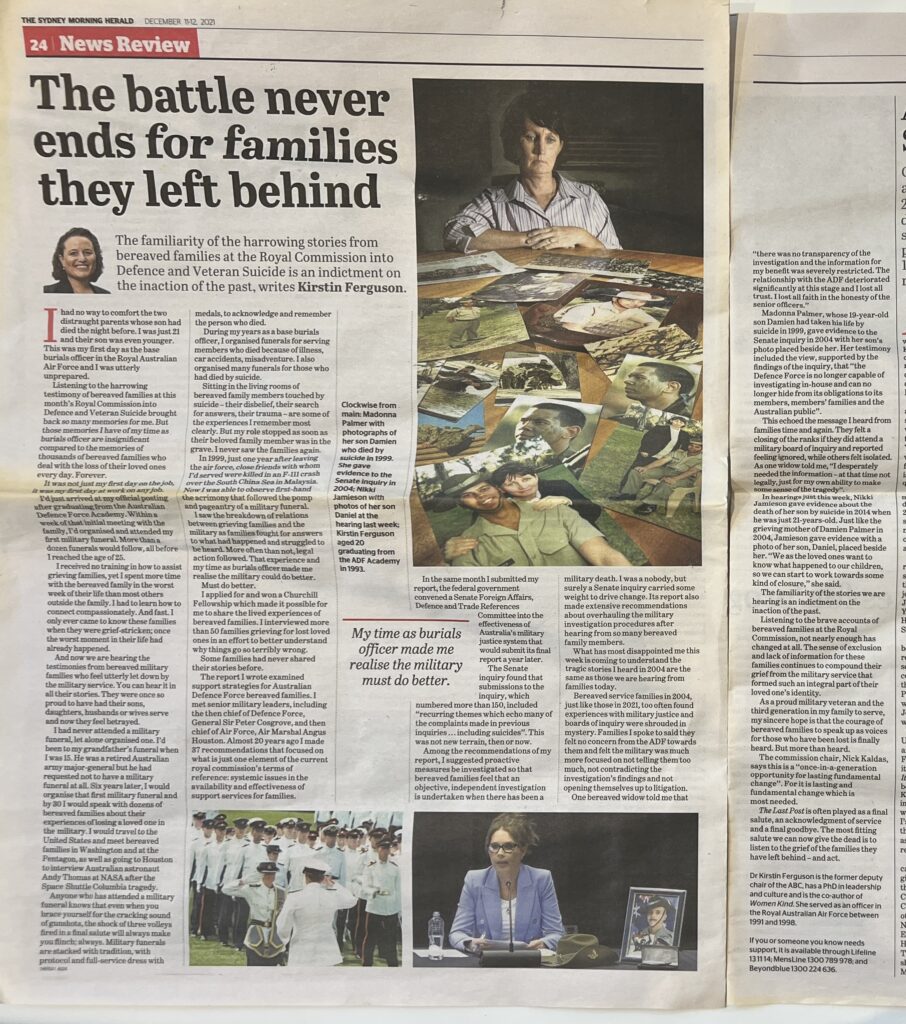
Complete the Head & Heart Leader Scale™ and receive a free, personalised report here.
Complete the Head & Heart Leader Scale™ and receive a free, personalised report here.
Kirstin Ferguson
December 11, 2021
I had no way to comfort the two distraught parents whose son had died the night before. I was just 21 and their son was even younger. This was my first day as the base burials officer in the Royal Australian Air Force and I was utterly unprepared.
Listening to the harrowing testimony of bereaved families at this month’s Royal Commission into Defence and Veteran Suicide brought back so many memories for me. But those memories I have of my time as burials officer are insignificant compared to the memories of thousands of bereaved families who deal with the loss of their loved ones every day. Forever.
It was not just my first day on the job, it was my first day at work on any job.
I’d just arrived at my official posting after graduating from the Australian Defence Force Academy. Within a week of that initial meeting with the family, I’d organised and attended my first military funeral. More than a dozen funerals would follow, all before I reached the age of 25.
I received no training in how to assist grieving families, yet I spent more time with the bereaved family in the worst week of their life than most others outside the family. I had to learn how to connect compassionately. And fast. I only ever came to know these families when they were grief-stricken; once the worst moment in their life had already happened.
And now we are hearing the testimonies from bereaved military families who feel utterly let down by the military service. You can hear it in all their stories. They were once so proud to have had their sons, daughters, husbands or wives serve and now they feel betrayed.
I had never attended a military funeral, let alone organised one. I’d been to my grandfather’s funeral when I was 15. He was a retired Australian army major-general but he had requested not to have a military funeral at all. Six years later, I would organise that first military funeral and by 30 I would speak with dozens of bereaved families about their experiences of losing a loved one in the military. I would travel to the United States and meet with bereaved families in Washington and at the Pentagon, as well as going to Houston to interview Australian astronaut Andy Thomas at NASA after the Space Shuttle Columbia tragedy.
Anyone who has attended a military funeral knows that even when you brace yourself for the cracking sound of gunshots, the shock of three volleys fired in a final salute will always make you flinch; always. Military funerals are stacked with tradition, with protocol and full-service dress with medals, to acknowledge and remember the person who died.
During my years as a base burials officer, I organised funerals for serving members who died because of illness, car accidents, misadventure. I also organised many funerals for those who had died by suicide.
Sitting in the living rooms of bereaved family members touched by suicide – their disbelief, their search for answers, their trauma – are some of the experiences I remember most clearly. But my role stopped as soon as their beloved family member was in the grave. I never saw the families again.
In 1999, just one year after leaving the air force, close friends with whom I’d served were killed in an F-111 crash over the South China Sea in Malaysia. Now I was able to observe first-hand the acrimony that followed the pomp and pageantry of a military funeral.
I saw the breakdown of relations between grieving families and the military as families fought for answers to what had happened and struggled to be heard. More often than not, legal action followed. That experience and my time as burials officer made me realise the military could do better.
Must do better.
I applied for and won a Churchill Fellowship which made it possible for me to share the lived experiences of bereaved families. I interviewed more than 50 families grieving for lost loved ones in an effort to better understand why things go so terribly wrong. Some families had never shared their stories before.
The report I wrote examined support strategies for Australian Defence Force bereaved families. I met with senior military leaders, including the then chief of Defence Force, General Sir Peter Cosgrove, and then chief of Air Force, Air Marshal Angus Houston. Almost 20 years ago I made 37 recommendations that focused on what is just one element of the current royal commission’s terms of reference: systemic issues in the availability and effectiveness of support services for families.
In the same month I submitted my report, the federal government convened a Senate Foreign Affairs, Defence and Trade References Committee into the effectiveness of Australia’s military justice system that would submit its final report a year later.
The Senate inquiry found that submissions to the inquiry, which numbered more than 150, included “recurring themes which echo many of the complaints made in previous inquiries … including suicides”. This was not new terrain, then or now.
Among the recommendations of my report, I suggested proactive measures be investigated so that bereaved families feel that an objective, independent investigation is undertaken when there has been a military death. I was a nobody, but surely a Senate inquiry carried some weight to drive change. Its report also made extensive recommendations about overhauling the military investigation procedures after hearing from so many bereaved family members.
What has most disappointed me this week is coming to understand the tragic stories I heard in 2004 are the same as those we are hearing from families today. These are the same stories which are always told to anyone who will listen.
Bereaved service families in 2004, just like those in 2021, too often found experiences with military justice and boards of inquiry were shrouded in mystery. Families I spoke to said they felt no concern from the ADF towards them and felt the military was much more focused on not telling them too much, not contradicting the investigation’s findings and not opening themselves up to litigation.
One bereaved widow told me that “there was no transparency of the investigation and the information for my benefit was severely restricted. The relationship with the ADF deteriorated significantly at this stage and I lost all trust. I lost all faith in the honesty of the senior officers.”
Madonna Palmer, whose 19-year-old son Damien had taken his life by suicide in 1999, gave evidence to the Senate inquiry in 2004 with her son’s photo placed beside her. Her testimony included the view, supported by the findings of the inquiry, that “the Defence Force is no longer capable of investigating in-house and can no longer hide from its obligations to its members, members’ families and the Australian public”.
This echoed the message I heard from families time and again. They felt a closing of the ranks if they did attend a military board of inquiry and reported feeling ignored, while others felt isolated. As one widow told me, “I desperately needed the information – at that time not legally, just for my own ability to make some sense of the tragedy”.
In hearings just this week, Nikki Jamieson gave evidence about the death of her son by suicide in 2014 when he was just 21 years old. Just like the grieving mother of Damien Palmer in 2004, Jamieson gave evidence with a photo of her son, Daniel, placed beside her. “We as the loved ones want to know what happened to our children, so we can start to work towards some kind of closure,” she said.
The familiarity of the stories we are hearing is an indictment on the inaction of the past.
Listening to the brave accounts of bereaved families at the Royal Commission, not nearly enough has changed at all. The sense of exclusion and lack of information for these families continues to compound their grief from the military service that formed such an integral part of their loved one’s identity.
As a proud military veteran and the third generation in my family to serve, my sincere hope is that the courage of bereaved families to speak up as voices for those who have been lost is finally heard.
But more than heard. The commission chair, Nick Kaldas, says this is a “once-in-a-generation opportunity for lasting fundamental change”. For it is lasting and fundamental change which is most needed.
The Last Post is often played as a final salute, an acknowledgment of service and a final goodbye. The most fitting salute we can now give the dead is to listen to the grief of the families they have left behind – and act.
Dr Kirstin Ferguson is the former deputy chair of the ABC, has a PhD in leadership and culture and is the co-author of Women Kind. She served as an officer in the Royal Australian Air Force between 1991 and 1998.
If you or someone you know needs support, it is available through Lifeline 13 11 14; MensLine 1300 789 978; and Beyondblue 1300 224 636.





